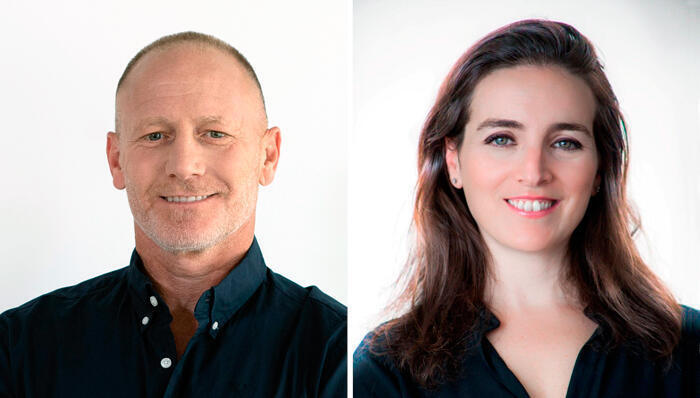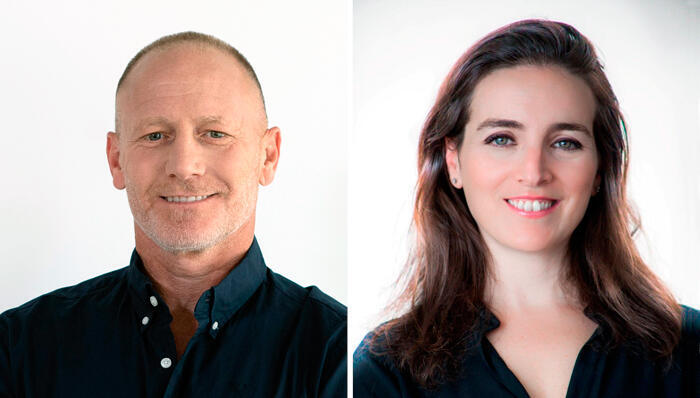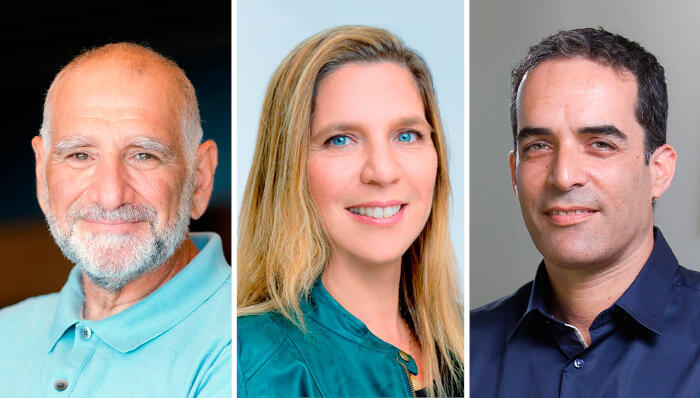
“It is an excellent time to build young companies and an excellent time to invest in new companies”
Ahead of the Calcalist and Poalim Hi-Tech roadshow event, we asked some of the 24 investors who will participate in the event to estimate what the coming year will look like for early-stage high-tech companies
"2023 will be better than the previous one for early stage Israeli startups. First of all, because large and global companies are laying off quite a few employees and are no longer attracting potential entrepreneurs to high-paying management positions. This process restores the motivation to establish new ventures and the costs of establishing startups are going down." said Michal Kissos-Hertzog, CEO of Poalim Hi-Tech, in an interview ahead of the Calcalist and Poalim Hi-Tech Roadshow event. According to Kissos, the 2022 data shows a change in investors' appetite in favor of investing in early rounds, especially in Seed rounds.
"These two reasons combined can point to a change in trend and a shift to an increase in the opening of new startups. This is a change in trend that we really need," said Kissos. "In addition, the state is aiming to significantly increase the number of high-tech employees, such a goal requires the state to grow early-stage startups that will be a breeding ground for large companies that will employ many people in order to serve this goal."
Calcalist's roadshow event, in collaboration with Poalim Hi-Tech, will take place mid-November and connect startup companies in the pre-Seed and Seed stages with leading investors in Israel. The purpose of the event is to create an opportunity for 24 entrepreneurs to meet 24 partners within the leading venture capital funds in Israel in a concentrated series of 1:1 meetings. In addition, there will be personal mentoring and focused content seminars, which will help the company’s raise capital and deepen connections in the industry - all in one day, under one roof.
Kobi Samborsky, co-founder of Gillot Capital, also believes that 2023 will be an excellent year for investments and establishing new companies. "The last year was a year of change, it started with great fanfare and ended in a much less positive atmosphere. In any case, I am very optimistic, because even if the general atmosphere remains gloomy, I believe it is an excellent time to build young companies and an excellent time to invest in new companies. In my estimation, during the year we'll start to see a recovery, but I wouldn't wait. If I'm an early stage entrepreneur with a great team and a great idea - I'd get going right away. It's been proven in the past that a time of crisis is great for starting new companies.”
Yahal Zilka, Managing Partner and Co-Founder at 10D, is another investor who believes that 2023 will be better for early stage startups. "First of all, there is a lot of money in the market that is 'sitting on the fence' (Dry Powder) focused on investments at earlier stages. Also, the early-stage market is less affected compared to more advanced rounds. Today's investors are more selective and, in our estimation, we will see more extension rounds. The trend of tightening budgets apparently gives an advantage to the new and young companies, along with more realistic and more appropriate valuations," explained Zilka.
On the other hand, there are also investors who express less optimistic assessments and refer to the coming year in more challenging terms. In the estimation of Merav Weinryb, CEO of Qualcomm Ventures, "2023 will be more difficult because the market is starting to feel a slowdown, and such a situation creates difficulty for the companies to meet their financial goals (KPIs) which extend to their next recruitment round, and may create difficulties for them."
According to Jonny Saacks, Managing Partner at F2 Venture Capital, at this point it is appropriate to separate companies in the Seed stages from those in A and B fundraising rounds. "I think we will see more Seed fundraisings, maybe little lower valuations, but overall this is expected to be a better year for Seed companies and I am sure that some of the best Israeli companies we will see in the next decade will be born in 2023. However, for companies in rounds A and B conditions will be tougher in the coming year. The threshold will be higher, the valuations will be lower (as a derivative of profits) and not all the companies that have already raised Seed capital will be able to raise additional financing."
Such an explosive and volatile financial environment affects not only specific companies but also entire industries and may make some of them much less attractive for investment, even dangerous, and on the other hand push forward industries where there is an opportunity for rapid growth. Correct interpretation of the sentiments in the investment market is important for entrepreneurs who are at the beginning of the road and can save them from certain failures or vice versa - help them increase the demand for their solutions. According to Saacks, “investors are currently mainly looking for companies with 'healthy growth' and a path to growth in profitability - and not companies that show growth at any cost. Therefore, I recommend entrepreneurs not to enter areas that are already too crowded or those whose business model is not clear."
According to Samborsky, in times like these there is a return to the basics. A return to products that customers really need. "Cyber continues to be a significant field because the price of not investing in cyber is too high. Cloud technologies and their derivatives also continue to be critical because organizations are continuing to move into the cloud, although here, we see more emphasis on solutions that help manage the organization's cloud expenses more efficiently and fewer solutions companies can live without. Similarly, niche solutions are less interesting at a time like this. Customers are looking for broad platforms that solve a range of needs for them and do not want to buy many products. It is likely that the demand for consolidation will continue to rise."
Zilka uses the public markets as a "proxy", to understand which areas investors would shy away from investing in. "The sectors in which companies have already suffered declines to low multipliers in the public markets - such as insurtech or adtech - will also receive low multipliers in the private market. On the other hand, sectors that require long investment periods of 5-10 years and much patience, such as climate-tech or quantum computing, will be less affected by the fluctuating financial situations," Zilka estimates.
According to Winryb, as in previous years, the software field where revenues can be presented relatively quickly will continue to be attractive, but the consumer market at a time when the entire economy is on the brink of recession - becomes especially challenging for new investments and of course for entrepreneurs who present developments for it.
One of the most important terms in this period for relatively young companies is "product market fit" - the company's ability to adapt its product to the market and its consumers. All investors see PMF as a really critical means to assess the future capabilities of a startup in its early stages. "It is difficult to define what the product market fit is or what it should look like and it differs from company to company," said Saacks. "However, when it happens - you'll know you've cracked it. Companies will start receiving more and more inbound inquiries, the speed of interactions with customers will increase and the spread time will shorten. In my approach, to achieve PMF you need to start by understanding who your ideal customer is, what value you give them, how to measure that and respond to the market quickly and continue to learn and improve your product."
"PMF is very important for young companies and for most of them it takes time to crack. Without precisely adjusting to the market, it is almost impossible to build successful companies," claims Samborsky. "We at Glilot have developed a structured process, Mach5, which takes a company without a PMF and puts it through a series of processes of product and story accuracy - until we reach PMF. The process takes three to eight months and it almost always works. You can't expect a Seed company to have PMF, but a certain level of it is already required at the A round investment stage. From our experience, implementing such processes already in the first weeks of the company and entering into a real discussion with potential customers about the product - reduces the need for a significant pivot and the chances of success increase greatly."
How does the financial slowdown affect the valuations of early-stage startups?
Samborsky: "The change in the value of early stage companies exists, but it is much less significant than in later stages. In the end, a company must raise enough money to meet its goals (the goals did not decrease, they actually increased) and a smart investor understands that he cannot own too much of the company at this stage. This creates a situation in which the value does not change significantly. The later the stage, the greater the difference in value becomes."
Zilka: “All startups - without exception - are affected by the change in the financial markets and valuations have decreased significantly at all stages. The companies that are most affected are growth companies that have raised funds in high values of over one billion dollars. Companies that raised funds on the basis of future growth and not on the basis of actual revenues - will suffer and may have difficulty in further fundraising. Companies in the Seed and A stages will also be affected - but relatively less."
Saacks: "We are seeing declines in valuations for several reasons. First, if the company has revenues, then the valuation is lower, because multiples have dropped significantly (and public companies are a good proxy for this). Second, many investors are less eager to invest now, so there are fewer deals and the prices are going down. Finally, startup founders have realized that they need to grow their company in the ‘right way, i.e. increase the value over time based on performance, instead of performing a momentary optimization that will result in the highest possible valuation. This will not be sustainable in the future and they do not want to be in a position where in the future they will receive an investment with a decreased valuation. Despite all of this - we still see transactions at high valuations because there is a lot of capital in the market to hand out. But this is not the norm."
To conclude the discussion, we asked the investors to indicate the three most important points, in their opinion, that startup founders should focus on.
Kissos: "Especially at a time when it's harder to raise capital - it's important to remember the basics. There are so many stages you have to go through, things that you can only discover if you actually go to the market and get feedback on your product. Therefore, my advice is to think about releasing your MVP relatively fast, so you can prove or disprove your hypothesis and continue building your product or solution gradually. Step by step."
Weinryb: “The three most important points for entrepreneurs are: Runway - to create a track for the company as long as possible with the money in the bank, building a track for profitability - because now VC’s will look more at profitability and unit economics - making sure that there is a horizon for profitability (of course there is no expectation of profitability at an early stage). Since there is less money in the market - this is the time to make connections with new investors and maintain good relations with your current investors."
Samborsky: "For me, the three most important things at this stage are: the customers, the employees (effective management of the resources at their disposal) and the expenses. The third point sounds simple but it is not, companies still have to spend a lot to grow very quickly, that has not changed. But today, expenses should be very calculated and must bring clear and immediate value (at least until the next round). Otherwise, it is better to avoid them."
Zilka: "First, managing resources and cash that will bring them towards income or an outline for financial balance. Second, build and maintain relationships with potential investors even though they are not currently recruiting. Finally, build a flexible and agile system and organization that can quickly adapt to changing situations."
Saacks: "My approach is to focus on the basic values, identify the ideal customer and build a sales model that can be used very frequently."















